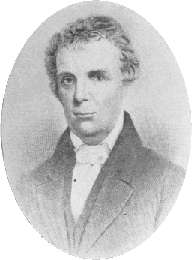|
Disciples Of Christ Historical Society
Disciples of Christ Historical Society is the official archives for congregations of the Stone-Campbell tradition, also known as the Restoration Movement. The Society is incorporated as a general ministry of the Christian Church (Disciples of Christ) and serves the three branches (called "streams") of the Stone-Campbell tradition: the Churches of Christ, Independent Christian Churches/Churches of Christ and the Christian Church (Disciples of Christ). The Stone-Campbell tradition is named for the men generally recognized as its founders and early leaders, Barton Warren Stone (1772–1844) and Alexander Campbell (1788–1866). The Stone-Campbell tradition began on the Appalachian frontier in the early 1800s. History Disciples of Christ Historical Society was founded in 1941 and, from 1952 to 2015, was located in Nashville, Tennessee, where the Society was housed in the Thomas W. Phillips Memorial Archives, built in 1958 and placed on the National Register of Historic Places in 2 ... [...More Info...] [...Related Items...] OR: [Wikipedia] [Google] [Baidu] |
Stone-Campbell Movement
The Restoration Movement (also known as the American Restoration Movement or the Stone–Campbell Movement, and pejoratively as Campbellite, Campbellism) is a Christianity, Christian movement that began on the United States frontier during the Second Great Awakening (1790–1840) of the early 19th century. The pioneers of this movement were seeking to reform the church from within and sought "the unification of all Christians in a single body patterned after the church of the New Testament."Rubel Shelly, ''I Just Want to Be a Christian'', 20th Century Christian, Nashville, Tennessee, TN 1984, The Restoration Movement developed from several independent strands of religious revival that idealized early Christianity. Two groups, which independently developed similar approaches to the Christian faith, were particularly important. The first, led by Barton W. Stone, began at Cane Ridge, Kentucky, and identified as "Christians (Stone Movement), Christians". The second began in western ... [...More Info...] [...Related Items...] OR: [Wikipedia] [Google] [Baidu] |
Christian Church (Disciples Of Christ)
The Christian Church (Disciples of Christ) is a mainline Protestant Christian denomination in the United States and Canada. The denomination started with the Restoration Movement during the Second Great Awakening, first existing during the 19th century as a loose association of churches working towards Christian unity, then slowly forming quasi-denominational structures through missionary societies, regional associations, and an international convention. In 1968, the Disciples of Christ officially adopted a denominational structure at which time a group of churches left to remain nondenominational. It is often referred to as The Christian Church, The Disciples of Christ, The Disciples, or the DOC. The Christian Church was a charter participant in the formation of the World Council of Churches (WCC) and of the Federal Council of Churches (now the National Council of Churches), and it continues to be engaged in ecumenical conversations. The Disciples' local churches are congre ... [...More Info...] [...Related Items...] OR: [Wikipedia] [Google] [Baidu] |
Churches Of Christ
The Churches of Christ is a loose association of autonomous Christian congregations based on the ''sola scriptura'' doctrine. Their practices are based on Bible texts and draw on the early Christian church as described in the New Testament. The Churches of Christ are represented across the world. Typically, their distinguishing beliefs are that of the necessity of baptism for salvation and the prohibition of instruments in worship. They identify themselves as being nondenominational. The Churches of Christ arose from the Restoration Movement of 19th-century evangelism by groups who declared independence from denominations and traditional creeds. They sought "the unification of all Christians in a single body patterned after the original church of the New Testament."Rubel Shelly, ''I Just Want to Be a Christian'', 20th Century Christian, Nashville, Tennessee 1984, The Restoration Movement was not a purely North American phenomenon. There are now Churches of Christ in Africa, ... [...More Info...] [...Related Items...] OR: [Wikipedia] [Google] [Baidu] |
Independent Christian Churches/Churches Of Christ
The group of churches known as the Christian Churches and Churches of Christ is a fellowship of congregations within the Restoration Movement (also known as the Stone-Campbell Movement and the Reformation of the 19th Century) that have no formal denominational affiliation with other congregations, but still share many characteristics of belief and worship. Churches in this tradition are strongly congregationalist and have no formal denominational ties, and thus there is no proper name that is agreed to apply to the movement as a whole. Most (but not all) congregations in this tradition include the words "Christian Church" or "Church of Christ" in their congregational name. Due to the lack of formal organization between congregations, there is a lack of official statistical data, but the 2016 ''Directory of the Ministry'' documents some 5000 congregations in the USA and Canada; some estimate the number to be over 6,000 since this directory is unofficial. These congregations sha ... [...More Info...] [...Related Items...] OR: [Wikipedia] [Google] [Baidu] |
Barton Stone
Barton Warren Stone (December 24, 1772 – November 9, 1844) was an American evangelist during the early 19th-century Second Great Awakening in the United States. First ordained a Presbyterian minister, he and four other ministers of the Washington Presbytery resigned after arguments about doctrine and enforcement of policy by the Kentucky Synod. This was in 1803, after Stone had helped lead the mammoth Cane Ridge Revival, a several-day communion season attended by nearly 20,000 persons. Stone and the others briefly founded the Springfield Presbytery, which they dissolved the following year, resigning from the Presbyterian Church altogether. They formed what they called the Christian Church, based on scripture rather than a creed representing the opinion of man. He later became allied with Alexander Campbell, a former Presbyterian minister who was also creating an independent path, sometimes allied with Baptists, and formed the Restoration Movement. Stone's followers we ... [...More Info...] [...Related Items...] OR: [Wikipedia] [Google] [Baidu] |
Alexander Campbell (minister)
Alexander Campbell (12 September 1788 – 4 March 1866) was a Scots-Irish immigrant who became an ordained minister in the United States and joined his father Thomas Campbell as a leader of a reform effort that is historically known as the Restoration Movement, and by some as the "Stone-Campbell Movement." It resulted in the development of non-denominational Christian churches, which stressed reliance on scripture and few essentials.McAllister, Lester and Tucker, William E. ''Journey in Faith'' St. Louis, Missouri: The Bethany Press, 1975. Campbell was influenced by similar efforts in Scotland, in particular, by James and Robert Haldane, who emphasized their interpretation of Christianity as found in the New Testament. In 1832, the group of reformers led by the Campbells merged with a similar movement that began under the leadership of Barton W. Stone in Kentucky.Douglas Allen Foster and Anthony L. Dunnavant, ''The Encyclopedia of the Stone-Campbell Movement: Christian Church ... [...More Info...] [...Related Items...] OR: [Wikipedia] [Google] [Baidu] |
Nashville, Tennessee
Nashville is the capital city of the U.S. state of Tennessee and the county seat, seat of Davidson County, Tennessee, Davidson County. With a population of 689,447 at the 2020 United States census, 2020 U.S. census, Nashville is the List of municipalities in Tennessee, most populous city in the state, List of United States cities by population, 21st most-populous city in the U.S., and the fourth most populous city in the southeastern United States, southeastern U.S. Located on the Cumberland River, the city is the center of the Nashville metropolitan area, which is one of the fastest growing in the nation. Named for Francis Nash, a general of the Continental Army during the American Revolutionary War, the city was founded in 1779. The city grew quickly due to its strategic location as a port on the Cumberland River and, in the 19th century, a railroad center. Nashville seceded with Tennessee during the American Civil War; in 1862 it was the first state capital in the Confederate ... [...More Info...] [...Related Items...] OR: [Wikipedia] [Google] [Baidu] |
Thomas Wharton Phillips, Jr
Thomas may refer to: People * List of people with given name Thomas * Thomas (name) * Thomas (surname) * Saint Thomas (other) * Thomas Aquinas (1225–1274) Italian Dominican friar, philosopher, and Doctor of the Church * Thomas the Apostle * Thomas (bishop of the East Angles) (fl. 640s–650s), medieval Bishop of the East Angles * Thomas (Archdeacon of Barnstaple) (fl. 1203), Archdeacon of Barnstaple * Thomas, Count of Perche (1195–1217), Count of Perche * Thomas (bishop of Finland) (1248), first known Bishop of Finland * Thomas, Earl of Mar (1330–1377), 14th-century Earl, Aberdeen, Scotland Geography Places in the United States * Thomas, Illinois * Thomas, Indiana * Thomas, Oklahoma * Thomas, Oregon * Thomas, South Dakota * Thomas, Virginia * Thomas, Washington * Thomas, West Virginia * Thomas County (other) * Thomas Township (other) Elsewhere * Thomas Glacier (Greenland) Arts, entertainment, and media * ''Thomas'' (Burton novel) 1969 novel ... [...More Info...] [...Related Items...] OR: [Wikipedia] [Google] [Baidu] |
National Register Of Historic Places
The National Register of Historic Places (NRHP) is the United States federal government's official list of districts, sites, buildings, structures and objects deemed worthy of preservation for their historical significance or "great artistic value". A property listed in the National Register, or located within a National Register Historic District, may qualify for tax incentives derived from the total value of expenses incurred in preserving the property. The passage of the National Historic Preservation Act (NHPA) in 1966 established the National Register and the process for adding properties to it. Of the more than one and a half million properties on the National Register, 95,000 are listed individually. The remainder are contributing resources within historic districts. For most of its history, the National Register has been administered by the National Park Service (NPS), an agency within the U.S. Department of the Interior. Its goals are to help property owners and inte ... [...More Info...] [...Related Items...] OR: [Wikipedia] [Google] [Baidu] |
Bethany, West Virginia
Bethany is a town in southern Brooke County, West Virginia, United States. The population was 756 at the 2020 census. It is part of the Weirton–Steubenville metropolitan area. It is best known as the home of Bethany College, a private liberal arts college that was the first institution of higher education in what is now West Virginia. History The town most likely was named after Bethany, a biblical place where Jesus raised Lazarus from the dead (although there is no public record of the dead rising in West Virginia). The Bethany Historic District was listed on the National Register of Historic Places in 1982. Located within the district are the separately listed Alexander Campbell Mansion, Delta Tau Delta Founders House, Old Bethany Church, Old Main, and Pendleton Heights. Geography Bethany is located at (40.206423, -80.559621). According to the United States Census Bureau, the town has a total area of , all land. Demographics 2010 census At the 2010 census there we ... [...More Info...] [...Related Items...] OR: [Wikipedia] [Google] [Baidu] |
Bethany College (West Virginia)
Bethany College is a private liberal arts college in Bethany, West Virginia. Founded in 1840 by Alexander Campbell of the Restoration Movement, who gained support by the Virginia legislature, Bethany College was the first institution of higher education in what is now West Virginia. History A liberal arts college, Bethany was chartered on March 2, 1840, by the Virginia legislature and given "all degree-granting powers" of the University of Virginia. West Virginia's secession from Virginia on June 20, 1863, recognized existing Virginia charters; Bethany College continues to operate under the Virginia charter. It was founded by Alexander Campbell, a minister in the Restoration Movement who provided the land and funds for the first building and served as the first president. Bethany has been a four-year private liberal arts college affiliated with the Christian Church (Disciples of Christ), since its inception. This religious body, of which Campbell was one of the principal found ... [...More Info...] [...Related Items...] OR: [Wikipedia] [Google] [Baidu] |






